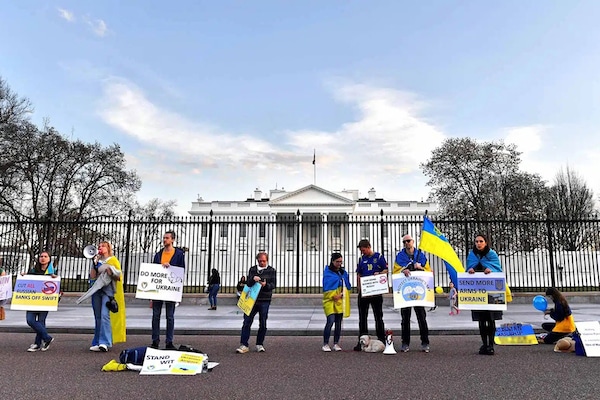The U.S./NATO war on Russia via its proxy Ukraine has awakened significant opposition here in the U.S. For example, over 90 different actions against the U.S. government, its wars, and imperialism were held last week under the initiative of the United National Antiwar Coalition (UNAC). Activists agree on the need to build up larger and stronger opposition to this war from an anti-imperialist standpoint.
It is helpful to know there is an expanding base among the working class people for the building up a stronger and more organized opposition to U.S. imperialist war than we have now. One way UNAC activists know this is from the positive responses seen while sloganeering and leafleting against the U.S. government war on Russia; calling for the U.S. government to open peace negotiations with Russia.
Polling by various specialized organizations, that are far from being progressive or socialist, also shows there is a good basis for building up the majority of the population against U.S. government war.
To this point, last November, a survey conducted by conservative think tank Chicago Council on Global Affairs showed that 35% of Americans oppose sending more arms to Ukraine, and 34% oppose sending more economic aid. These numbers grew from their previous survey.
Furthermore, people in the U.S. are now closely divided on whether Washington should support Ukraine “as long as it takes” (48%, down from 58% in July 2022), or whether Washington should urge Ukraine to settle for peace as soon as possible (47%, up from 38% in July).
A late July Harvard/Harris poll of registered voters found that 47% said the U.S. has “donated enough [to Ukraine] and should stop.”
According to a poll conducted by the Quincy Institute for Responsible Statecraft and Data for Progress in September, 57% of likely voters strongly or somewhat support the U.S. pursuing diplomatic negotiations as soon as possible to end the war in Ukraine, even if it requires Ukraine making compromises with Russia.
Likewise, according to 49% of likely voters, the Biden administration and Congress need to do more diplomatically to help end the war; 61% said they believe the war has impacted them financially on some level.

